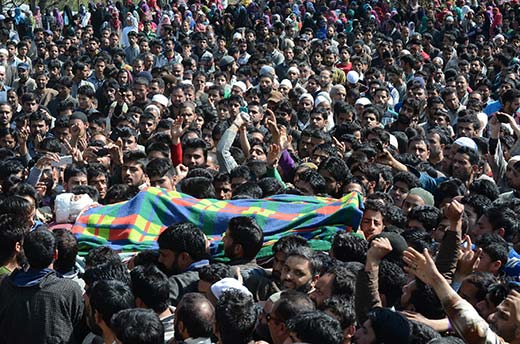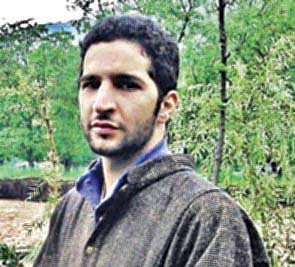Khalid Muzaffar Wani was killed in an army firing in Kamla forest on April 13, 2015. Brother of Hizb commander, Khalid’s killing was widely condemned. Bilal Handoo recreates his last summer meeting with the slain civilian

None was immediately confirming — what exactly was happening deep inside south Kashmir’s Kamla forest on the evening of April 13, 2015. Vague reports of gunshots were making rounds in Srinagar. And that was it.
But later as dusk fell over restive Tral, the jungle couldn’t conceal its wild secret any longer. It was known that army had gunned down an unarmed civilian inside the forest. And later shot a handout, claiming its kill, a Hizb militant.
By the time, smokescreen over the face-mutilated and bone-crushed body got clear, Tral raged on. Behind that simmer was the trigger of civilian killing — and not a usual Hizb killing in this part of south Kashmir.
Some 40km from Tral, the emerging news details were sending sceptical signals around Srinagar. I too started joining some disturbing dots.
And then that familiar face flashed across my digital screen. There he was — reduced from a striking mortal to a poignant image — then smiling, now slain and forever silenced!
I was looking at Khalid Muzaffar Wani — the slain youth I interviewed (a few months before his killing) in Tral related to my story.
I remember, it was June 22, 2014, and Tral was grieving the death of its three sons-turned-Hizb militants. Adil Mir, Tariq Parray and Adil Shah were killed in Buchoo, Tral on June 19, 2014. Among the slain trio, Adil Mir of Dadsara was Khalid’s cousin.
Khalid wearing blue shirt and black trousers was the first person who volunteered for an interview in the house gripped with mourning. As we were moving inside, I could see a name “Adil” painted on the main door.
Khalid seemed humble and friendly person to me. At first sight, I mistook him for Burhan — the same aquiline nose, the same light-coloured skin and the same blonde eyes.
“So, you are Burhan’s brother?”
“Yes, an elder one. We are three brothers and have one sister. Burhan Soab is the second one.”
“Okay. So, what motivated your brother, Burhan to pick up a gun at such a young age?”
“Burhan was a brilliant student. He was topper in his class. Dad wanted to see him a doctor. But…”
“But what?”
“He was pushed to extremes. In 2010, the two of us were having a joy ride in Amirabad Tral…”
“You mean during uprising?”
“No. Later that year.”
“Alright. So, what happened then?”
“STF men intercepted us and directed us to fetch a packet of cigarette and snacks.”
“And what did you do?”
“We did as ordered. But before letting us go, those men winked at paramilitary men playing cards nearby. They pounced on us.”
“Really?”
“Yes!”
“Did they beat you both?”
“Fortunately, not. Burhan managed to give them a slip and ran through a nearby graveyard. But, I was trapped. I heard him shouting: “I won’t leave you now!”
“Burhan said so, right?”
“Yes.”
“What about you?”
“I was hit hard on my arm before fainting. Later, when I regained my consciousness, I walked up to home, leaving behind my bike. And for one complete week, I was enduring that inflicted pain. But that assault was serious setback to us. Burhan was hurt, badly hurt.”
“What happened next?”
“Whatever had to happen had already happened…”

“What do you mean?”
“I mean, Burhan had made up his mind. He wanted retribution.”
“What?”
“Yes. As I said, he was badly hurt. He wanted to teach them a lesson.”
“Didn’t you stop him, I mean, you and your family?”
“Yes, we did.”
“What did you tell him?”
“We told him: ‘Look son, just forget and forgive. Move on. Pack up. We will send you away from all this. You will study either in America or England.’ ”
“What was his reply?”
“Nothing. He didn’t budge from his stand. He would fiercely argue with us: ‘How could they beat and treat us like this in our own land? What was/is our fault?’ You see, those were alarming words.”
“And then?”
“Then all damage control exercise proved useless when one day he left home to become Mujahid.”
“How old was he then?”
“Barely 15.”
“And he hadn’t appeared in his Class 10 exams yet, right?”
“Yes. He left home 10 days before his Board exams. As I said, he was pushed to pick up gun…”
“But, as you said, you were beaten up, and not Burhan. But then, you weren’t pushed to extremes?”
“Look, not everyone can withstand insults. Somehow, I brushed it aside by assuming it a normal course of our lives, but Burhan — at the end of the day is a different person having different take on things.”
“Agree, but, did you pay for being the brother of an active Mujahid?”
“Yes! I did.”
“Like?”
“Like, the day I was expected to appear for my University Entrance Exams, I was called up by Awantipora Police Station and was locked up. Later my father had to plead before Superintendent of Police for securing my release…”
“Do you think you deserve such treatment?”
“No! Such treatment is uncalled for. Look, I am not a militant. I just happened to be his brother. And I don’t think I deserve such treatment. Such treatment can provoke anyone, like it provoked Burhan.”
“So, how do you feel to live such life?”
“I feel scary.”
“Why?”
“Because I am being frequently called for questioning in police stations whenever anything happens in and around Tral. You see when Sarpanch, his son and a village Numberdar were killed in April this year (2014), I was picked up during that night itself.”
“On what basis?”
“Because I happen to be a brother of a militant, and that’s it!”
“Are such summons still on?”
“Yes, they are. You see when a rifle snatching incident surfaced in Tral, I was called up. And shortly after Pampore firing incident, I was taken from my home and locked up…”
“But don’t you say anything to them in your defence?”
“I do! I tell both police as well as army, ‘Go and catch my militant brother. It is between you and him. Why are you dragging me into all this?’ ”
“And how do they respond?”
“They don’t buy my argument. Instead, they say, ‘Help us to catch Burhan.’ But, is it possible for a brother to arrange arrest of his brother?”
“Hmm. So, does Burhan visit home?”
“He does. And I tell the same thing to cops: ‘Look, Burhan has left home for a just cause. You better deal with him now.’ And yes, whenever he wishes, he comes to meet his mother. I mean, who could stop a son from meeting his mother!”
“Alright. But, how do you respond to this argument, wherein state forces often say that militant history of your relative circle is pushing you to become militants?”
“Look, you need to understand something. Why should someone leave a comfortable life and live in jungles? Shall I tell you something, my cousin Shaheed Adil Mir was once threatened by a police officer, who told him: ‘I will take your eyes out of your sockets?’ ”
“But why?”
“Simply because he happened to be a brother of an active militant and that was his crime. I mean, why family members of militants should face such harassments? Such tactics can backfire and push one to pick up arms.”
“Are you saying – that is how Adil became Mujahid?”
“Yes. Do you know, he once applied for an army post along with his friend, Owais Mir. Though he was rejected on health grounds, but this event should give you an idea that Adil wasn’t into militancy from the beginning, but was rather pushed in to it. Just like his elder brother Nayeem…”
“Nayeem?”
“Yes, Nayeem, a B.Tech student at IUST, Awantipora. His cousin Mohammad Amin Mir, alias Zubair was an active militant. To arrest him, cops started stalking Nayeem. He was told: ‘If you don’t tell us about Zubair’s whereabouts, we will kill you on road.’ These repetitive threats forced Nayeem to join militancy. He thought it is better to die as a martyr than become a victim.”
“Both Zubair and Nayeem were killed in two separate encounters in 2010, right?”
“Yes. Zubair was killed in early 2010, while Nayeem was killed in September that year. And twenty days later, Adil joined Hizb…”
Khalid grew silent after his father and others stepped into the room. After that, he let them do all the talking. He sat silent, receptive and reactive.
But I never knew, ten months after our meeting, I would be writing his interview as his obituary!















